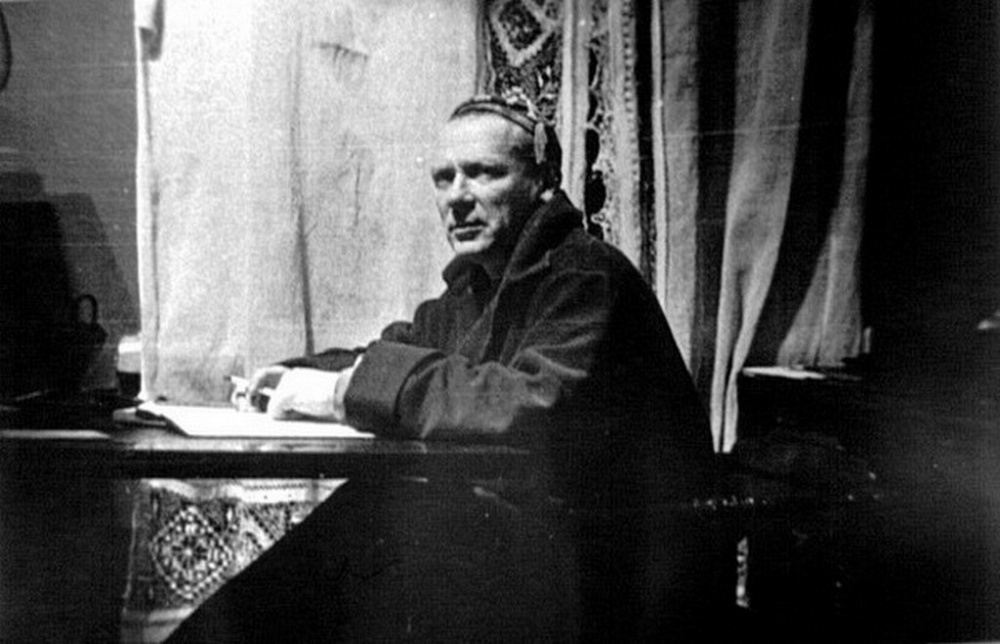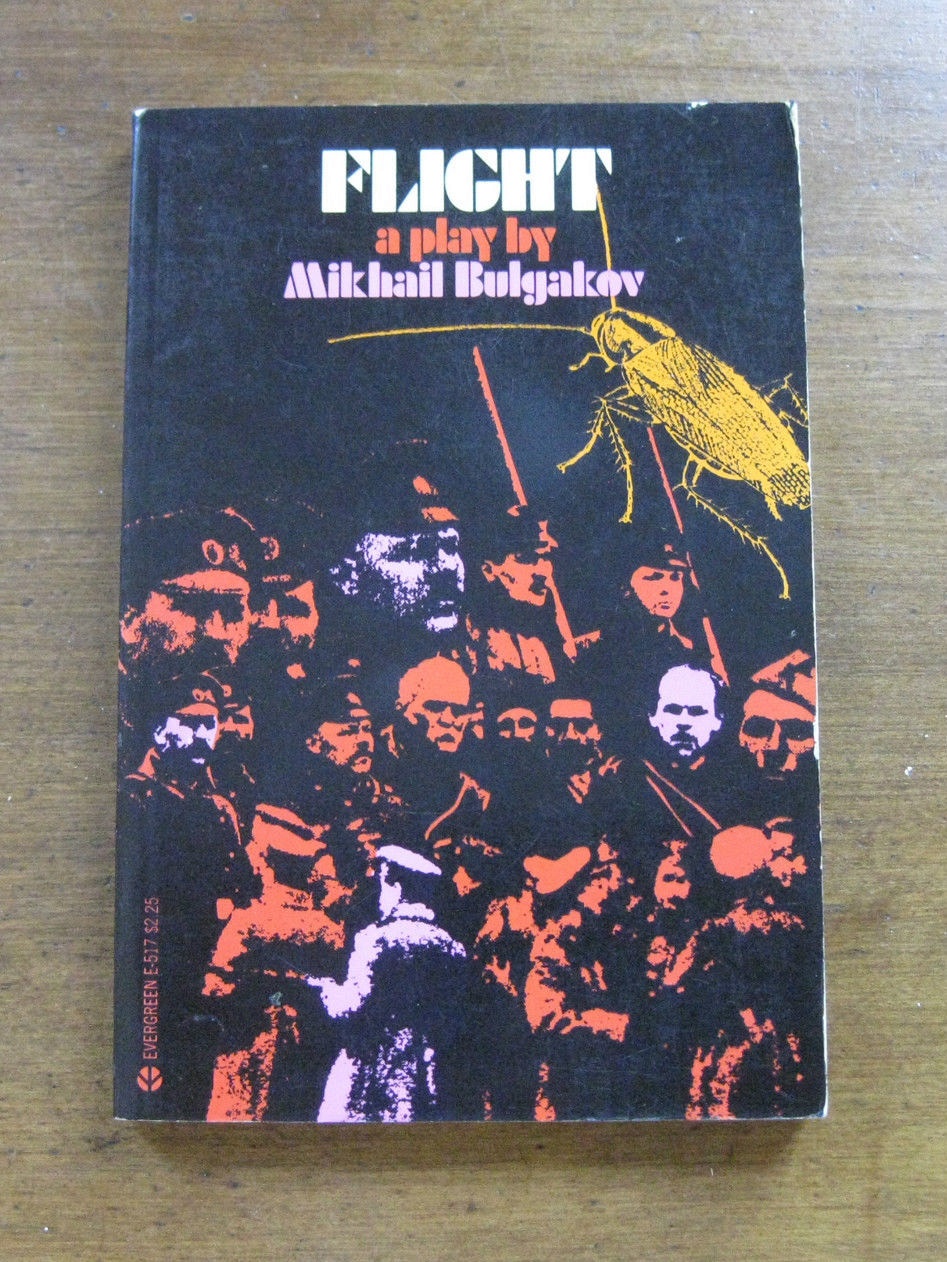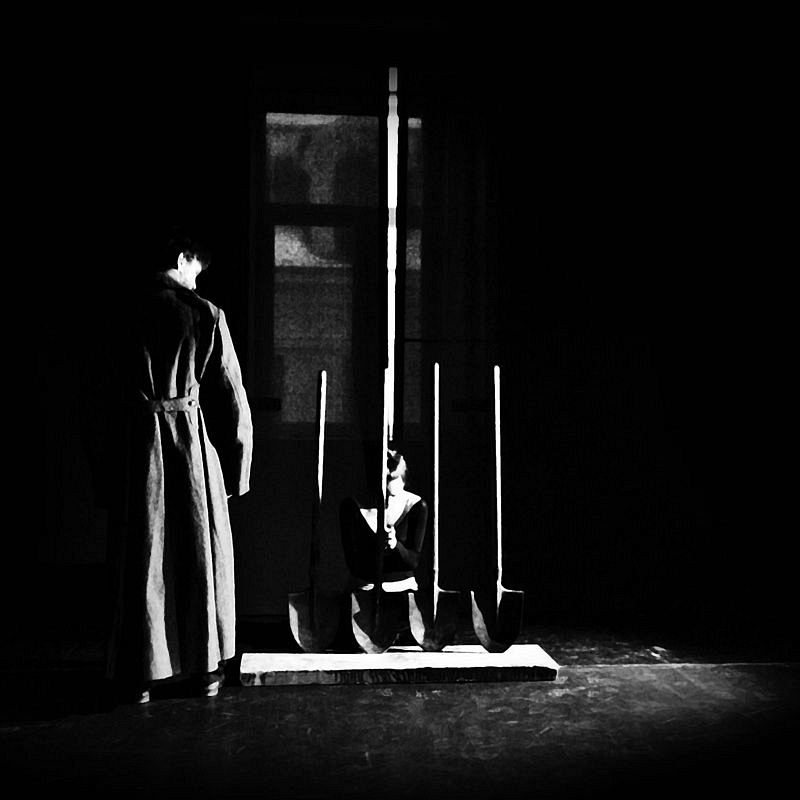“You can’t accomplish anything in war without love!” exclaims Lieutenant General Roman Khludov, a character in Mikhail Bulgakov’s The Run, a play that dictator Joseph Stalin personally banned from appearing on the Soviet stage.
Stalin has been dead and buried for decades, but his ghost still haunts the Russian landscape. I would not describe the ghost as friendly, but neither is it some kind of all-powerful demonic force. More often than not, it seems like a spirit confused, rattling chains to much effect in the attic but also wondering why it is fated to do so.
If Russia had moved on from the wounds of the twentieth century—both self-inflicted and otherwise—The Run would be an entirely uncontroversial play today. But that is not the case, so star theater director Yury Butusov decided to adapt The Run for the modern stage at Moscow’s Vakhtangov Theater, and you cannot watch the resulting production without shuddering.
There are definitely some things wrong with Butusov’s adaptation, not the least of which is the fact that the production clocks in at an exhausting three hours and fifty minutes. Russian theater is dominated by directors—a fact that I, as someone who writes plays in Russian, have struggled with—and sometimes that works out for the best, while at other times the amount of leeway they are given is just irritating. Still, the way in which Butusov combines surrealism with dark humor in The Run is so biting that it feels as though its literally drawing blood, and this does give the adaptation an awe-inspiring power.
The Run, one of Bulgakov’s lesser-known works, is a collection of dreams, or, more aptly, nightmares, centering on people fleeing the Red Army’s advance as the Russian Civil War draws to an agonizing conclusion. For those who make it out alive, there is no comfort or dignity or absolution. It is no wonder that Stalin wanted the play banned. Whatever part that remained human in the blood-thirsty, paranoid dictator, was a fan of Bulgakov’s work—this was probably the main reason why Bulgakov did not get shot during the Great Terror—but The Run drew too real and personal a portrait of those who opposed the Bolsheviks and lost.
Butusov draws on the chaos and confusion of Bulgakov’s play and amplifies them to an overwhelming effect. You do not always immediately know what is happening onstage, but you know how it makes you feel; the dread is a constant, dark, fuzzy aura that encircles every actor and prop.
A few days before my husband and I went to see The Run, I had a jolt of exactly the kind of dread Butusov conjures. I was walking out of the building we stay in when we are in Moscow with my son, who was chattering away; I adjusted his jacket and chattered back, answering his Russian with my English, as I always do, since we are raising him to be bilingual. Then I became aware of being watched.
An elderly neighbor I had spoken to exactly once in my life was standing on the sidewalk, affixing a heavy stare on me. “That’s her!” she exclaimed to a woman I had never seen before. I looked behind me, thinking she had meant someone else, but there was no one else. I could not hear all of what my neighbor was saying about me, but I definitely heard the words “English” and “foreigner.”
Even before Russia’s relations with the West deteriorated as the result of the Ukraine crisis and the annexation of Crimea, people in Moscow would frequently notice and even remark upon the fact that I speak English in public. Most of that was simple curiosity, as normal as a person turning their head upon hearing Russian spoken in a place like North Carolina. This was different. There was aggression and suspicion to my neighbor’s talk, I could tell.
The old woman in her too-warm coat just stood there, staring, not saying anything, not moving, her eyes fixed on me, an expression of hatred. I made eye contact with her several times, raised an eyebrow, and turned away. “I think there’s something wrong with our neighbor,” I told my husband as I got in the car. “She’s pissed off at me for speaking English.”
He told me that I was probably just imagining it, or else that it was some kind of a misunderstanding. Fair enough. I have lived in six different countries and can be sensitive to my status as an outsider, or, as Zadie Smith once put it, a person that belongs nowhere and hence belongs everywhere, but not without also annoying people who take comfort in homogeneity.
So much of what Bulgakov wrote about in The Run has to do with the cold, bereft feeling of not belonging anywhere. When the country you are defending, the country you love, ceases to exist is there anything left of you? For that matter, is there anything left of you by the time you have gone to horrifying lengths in order to defend this country?
Nearly a century after the events described in The Run, Russia has not reckoned with its past and therefore remains a place that inspires many strange dreams. Nobody really knows what this country is going to do next. I particularly doubt its leader, his courtiers, and his revisionist version of the past: that Lenin was a dangerous revolutionary, while Stalin was basically “alright.” Sure, everyone admits he might have “gone a little too far” with repression, but he is still seen as a decent bloke, a “complicated” guy. The reason is simple: there is no political will to really deal with the legacy of the repressions and force the nation toward a catharsis on that account. Under Putin, relations with the West have rotted, but an alleged pivot to Asia has yet to produce any tangible results. Power struggles rage within an elite that is so completely removed from daily life in the country that it might as well be living on Mars and flare-ups of violence are a testament to that. Repressions are so random that they almost seem accidental. Domestically, historic narratives about a noble, blameless, yet misunderstood and betrayed Russia are so exaggerated by the state media that they have begun to take on a tragicomic effect.
Butusov is aware of all this, of course, which is why the thread of anxiety that runs through his adaptation is, in fact, a live wire. The audience is constantly jolted, prodded, practically abused by his visual and auditory metaphors. “This is your story too,” the hanged soldiers and maniacally grinning dancing widows are basically saying. “You can’t get away from the past.”
During the intermission, my husband and I rush outside, greedily gulping down the April air. It is a lovely evening in the Russian capital, all inky skies and city lights trembling in puddles. It was just a few days after the neighbor incident, but we were not thinking about it. My husband is a director, I am a writer: we began to debate what it was we were seeing—whether it was working, whether it was overdone—when our nanny called.
“There is an old woman standing outside, pointing at our windows and screaming that a foreigner lives there and that she’s going to get ‘to the bottom of it,’ and have the police investigate,” our nanny reported. “I’m nervous.”
It was as if Bulgakov himself had been resurrected and was now standing with us in the gentle spring rain, smirking. Was the play overdone? How can something be overdone when it correctly reflects the absurdity of the present?
I did not even notice my eyes filling with tears. Perhaps I ought to be too ashamed to admit it, but I can get genuinely spooked by the police. “Hey, hey,” my husband said. “What’s this? We have to laugh about it. I love you, by the way. But we really have to laugh about it.”
I later found out that several other neighbors expressed outrage at the woman’s behavior, which included both screaming about me and about a family from central Asia, who happen to live a few floors above us. In the small building we stay in, everyone mostly keeps to themselves—requests to turn down each other’s music notwithstanding—which is, perhaps, the problem. In the absence of normal people being civically active, or, for that matter, merely neighborly, the vacuum is filled up by hysterical old ladies who grew up in a culture of denouncements and are comfortable carrying it over into the twenty-first century. Sometimes it takes a public spectacle to remind people that community, the simple act of refusing to despise each other, should not be taken for granted.
In Bulgakov’s play, General Khludov asks God to “give us the strength and mind to live through this Russian time of troubles.” Teasingly, Butusov asks his audience to contemplate whether or not they are living in a time of troubles too.
They are. We are. But it is trouble that has returned as a wan and frequently disoriented ghost. Ask the old woman why she hates me, for example, and it is doubtful that she will be able to give a coherent answer (apparently, some have tried). She just feels that she has to. It is the done thing. She has seen it on TV.
Unquiet spirits come back to demand something of the living, so that they may do the work the dead had failed to do. In Russia’s case, the work can begin with acknowledging the shame and sorrow buried in the national subconscious, rather than vigorous denials thereof—denials that result in a blind sort of pain, turned both inward and outward, clawing at itself even more effectually than it claws at others.
Ultimately, Khludov was right to point out that war does not work without love, especially a war with oneself. But modern Russia is in a place where it must stop trying to read Bulgakov’s metaphor backward. Love is doable without any war whatsoever.


